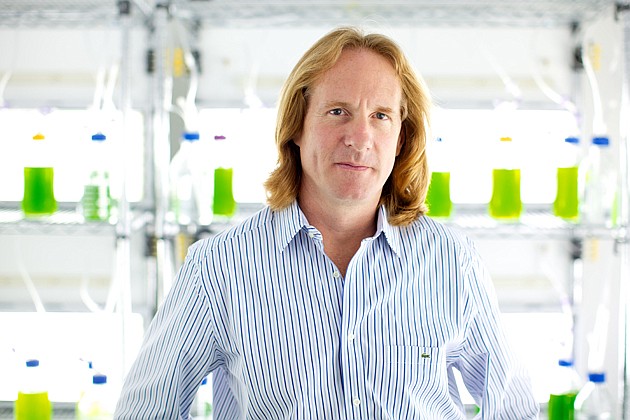- July 26, 2024
-
-
Loading

Loading

Paul Woods has had two blessings every entrepreneur desires: time and money.
The Canadian-born entrepreneur has labored to commercialize the production of ethanol from algae for more than six years. At a demonstration plant in south Lee County, Woods says Algenol Biofuels can now produce more than 10,000 gallons of ethanol per acre annually at a price of $1.27 a gallon.
Woods says Algenol's team of 165 employees, including some of the top scientists in the field, figured out a way to reproduce the lab results on a commercial scale. “That's something no other company has figured out,” Woods says.
Backed by millions of dollars from the heirs of the Corona beer fortune and India utility giant Reliance Industries, Algenol is negotiating to buy 4,000 acres in an undisclosed location in Central Florida where it plans to start producing millions of gallons of ethanol. Woods says he hopes to close on the land by Christmas, and have the permits in hand and start building the plant next year. Production could start in 2015.
Algenol is ahead of its competitors, many of which were startups that ran out of money before they could figure out how to successfully duplicate their lab results in the field. “What killed the little companies was they couldn't scale it,” Woods says.
“These [Algenol] guys are moving at lightning speed,” says Jim Lane, editor and publisher of Biofuels Digest, which tracks the industry players. “It's not a question of whether, but when.”
Working on the big problem
Scientists have been able to produce ethanol from algae in salt water and sunlight by feeding them carbon dioxide. But the difficult part was doing so on a commercial scale outside of ideal laboratory conditions.
After years of trials, Algenol designed 15-gallon bags it fills with algae and salt water and hangs on wire racks outdoors in the sunshine. In what looks like an oversized IV bag, the system pumps in carbon dioxide and sucks out the ethanol that algae produce. When the algae die, they're collected and used to make other fuels.
“Algenol is the algae-to-ethanol universe,” says Lane. “They're working on the big problem.”
The big problem, of course, is the world's dependence on oil. Besides that, Algenol provides other solutions: Its process uses algae instead of food such as corn, it uses salt water that's plentiful and it consumes carbon dioxide emissions that are linked to global warming.
On a per-acre yield, algae produce 15 to 20 times more ethanol than its competitors such as corn and sugarcane, giving it a significant advantage. “That is what we're capable of,” Woods says. “It really exists now.”
While Woods won't say where the 4,000-acre tract he's negotiating to buy is located, he hints it will be near a plant that produces carbon dioxide as a byproduct. With the help of local legislators, Woods says he has received assurances that he'll be able to obtain the necessary state permits.
Power plants and cement plants are two of the biggest producers of carbon dioxide in the state. “The biggest landholders in Florida have all been here,” Woods says. These include citrus producers whose businesses have been severely harmed by diseases such as citrus greening that have decimated swaths of their groves.
Big-money bet
But building a refinery and clearing 4,000 acres for a facility requires a huge capital investment. Woods estimates the cost will be $650 million, though he has deep-pocketed partners.
Last year, Mumbai, India-based Reliance Industries Limited invested $100 million in Algenol. Reliance is a publicly traded energy conglomerate that recently reported quarterly revenues of $17 billion.
Already, Woods and heirs of the Mexican family that sold Corona beer maker Grupo Modelo to Anheuser Busch last year have put in $70 million in the test facility in Lee County, where Algenol employs 125 people at the 90,000-square-foot facility on 20 acres. Algenol also has a research facility in Germany that employs 40 people.
The company received $10 million in incentives from Lee County and a $25 million grant from the federal government. “We're their poster child for success,” says Woods, a former gas industry entrepreneur who retired to Bonita Springs.
To build the new commercial plant, Woods says the Mexican investors will provide new funding and additional money may come from federally backed loans.
However, Woods concedes that the high capital cost of building a commercial facility may mean turning to the public markets in the future. Woods says he wants his company to remain private, but selling shares to the public would be the only way to fund such huge capital projects. “We need so much money to build these facilities,” he says.
Woods has been down that road before. After building Alliance Gas Management in Toronto, he took the company public in 1997 when annual revenues hit $100 million.
Another option is to license the technology and joint venture, especially for plants that might be built in other countries. Woods says foreign companies have expressed more interest in his technology because of the higher cost of fuel in those countries. One idea is to provide joint ventures with the algae in return for 25% of the venture.
Woods says oil companies have paid little attention to his endeavors. “They hate ethanol,” he shrugs. And he doesn't seem worried about oil companies' political clout. “My partners are so huge, what are you going to do to me?” he asks.
Whatever your opinion is of renewable energies, don't count Woods out. “I'm not going away,” he says.